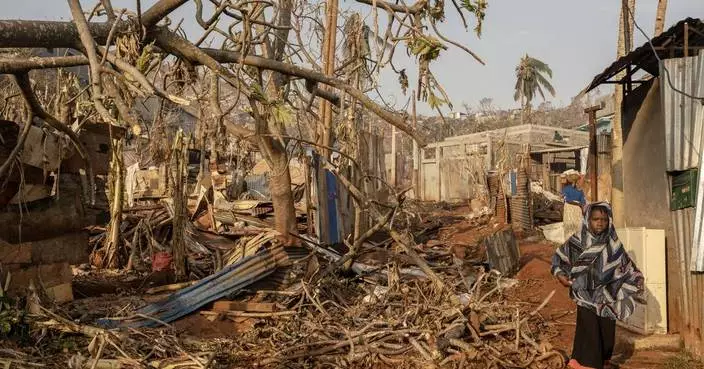SPRINGFIELD, Ohio (AP) — Ohio state police will help protect schools in a city at the center of a political furor over Haitian migrants, the governor announced Monday, while local officials canceled an annual celebration of cultural diversity in the fallout over former President Donald Trump’s false claims about pet-eating.
Ohio Gov. Mike DeWine, a Republican, has denounced the debunked rumors that spread online before Trump amplified them at last week's presidential debate, saying there is no evidence of it. He said at a news conference in Springfield on Monday that dozens of members of the Ohio State Highway Patrol will be stationed in city schools starting Tuesday following a series of threats across the city, sweeping each building every morning before the arrival of faculty or students. Security cameras have also been stationed at strategic spots in the city, and a bomb-sniffing dog will be in the city and available round-the-clock.
“We know that people are very, very concerned,” DeWine said. “But we’ve moved resources into Springfield. People have the right to feel safe as well as being safe.”
Springfield City Hall, several schools, and state motor vehicle offices in Springfield were forced to evacuate last week after receiving bomb threats. At least 33 separate bomb threats were made in recent days, all of them hoaxes, DeWine said. He said some of the threats came from overseas, but declined to name the country.
“The people who are doing this are doing this to sow discord in our community,” said Andy Wilson, director of the Ohio Department of Public Safety. "We just can’t let them do that. We can’t let them do that. We have to keep providing the services that the citizens of Springfield and Clark County expect."
Springfield has been the focus of intense attention in recent days after Trump, his running mate, Ohio Sen. JD Vance, and the Republican presidential campaign repeated false claims about Haitian immigrants eating domestic pets and waterfowl.
President Joe Biden, appearing in Philadelphia at the National HBCU Week Conference on Monday, addressed the situation in Springfield, condemning what he called the “lies and hate.”
“It’s wrong. It’s simply wrong. And it must stop,” he said.
Springfield canceled its annual celebration of diversity, arts and culture in response to the threats. The city’s two-day CultureFest had been scheduled to begin Sept. 27 but was called off “in light of recent threats and safety concerns,” Springfield officials announced Monday.
“We deeply regret having to cancel CultureFest, as we know it is a beloved event for our community,” City Manager Bryan Heck said in a statement. “However, the safety of our residents and visitors must come first.”
Two colleges in Springfield held classes virtually on Monday. Wittenberg University said it received two threats over the weekend, “both of which were targeted toward members of the Haitian Community.” Clark State College said it would operate virtually through Friday "due to recent events in Springfield."
The city itself seemed quiet on Monday. Among the diners at a Creole restaurant were friends Bill Teager and Paul Gomia, who had driven more than an hour to help support a Haitian-owned business.
“We’ve both just been incensed over the last week of what has happened to this town nationally and even locally,” Teager said.
Thousands of Haitian immigrants have settled in recent years in the predominantly white, blue-collar city of about 60,000, about 45 miles (70 kilometers) from the state capital of Columbus, where they have found work in factories and warehouses that had been struggling to fill job openings. The sudden influx has strained schools, health care facilities and city services and driven up the cost of housing.
DeWine acknowledged that Springfield has challenges but said that it’s a “city that frankly, is on the move. If you look where Springfield was 15 years ago, ten years ago, even five years ago, we’re moving.”
He declined to criticize Trump, saying the Biden administration’s record on immigration is a legitimate topic for debate. But he pointed out that the Haitians in Springfield are there legally under a federal program that allows them to remain in the country temporarily because conditions in Haiti are considered unsafe for them to return.
“The companies hire them because they needed the help and they needed the support,” DeWine said. “These are people who care about their families. These are people who value education. They are hard workers. And I think we should we should respect that.”
He added: “These ... people who are spreading the hate need to move on. They need to go away. They need to stop it.”
Rubinkam reported from northeastern Pennsylvania. Associated Press writer Ayanna Alexander in Philadelphia contributed to this report.

Republican Ohio Gov. Mike DeWine holds a news conference Monday, Sept. 16, 2024, at city hall in Springfield, Ohio, (AP Photo/Patrick Aftoora Orsagos)
TEL AVIV, Israel (AP) — A rocket fired from Yemen hit an area of Tel Aviv overnight, leaving 16 people slightly injured by shattered glass, the Israeli military said Saturday, days after Israeli airstrikes hit Houthi rebels who have been launching missiles in solidarity with Palestinians.
A further 14 people sustained minor injuries as they rushed to shelters when air raid sirens sounded before the projectile hit just before 4 a.m. Saturday, the military said.
The Houthi rebels issued a statement on the Telegram messaging app saying they had aimed a hypersonic ballistic missile at a military target, which they did not identify.
The attack comes less than two days after a series of Israeli airstrikes on Yemen’s Houthi rebel-held capital, Sanaa, and port city of Hodeida killed at least nine people. The Israeli strikes were in response to a Houthi attack in which a long-range missile hit an Israeli school building. The Houthis also claimed a drone strike targeting an unspecified military target in central Israel on Thursday.
The Israeli military says the Iran-backed Houthis have launched more than 200 missiles and drones during the Israel-Hamas war in Gaza. The Houthis have also been attacking shipping in the Red Sea and Gulf of Aden and say they won’t stop until there is a ceasefire in Gaza.
The Israeli strikes Thursday caused “considerable damage” to the Houthi-controlled Red Sea ports “that will lead to the immediate and significant reduction in port capacity,” U.N. spokesman Stephane Dujarric said. The port at Hodeida has been key for food shipments into Yemen in its decade-long civil war.
U.N. Secretary-General Antonio Guterres said both sides’ attacks risk further escalation in the region and undermine U.N. mediation efforts.
In the Gaza Strip on Saturday, mourners held the funerals of 19 people — 12 of them children — killed in Israeli strikes on Friday and overnight.
One of the strikes hit a residential building in the built-up Nuseirat refugee camp in central Gaza, killing at least seven Palestinians, including five children and one woman, and injuring 16 others, health officials said.
In Gaza City, another strike on a house overnight killed 12 people, including seven children and two women, according to Al-Ahli Hospital where the bodies were taken.
Mourners gathered at the hospital in Gaza City Saturday morning. Women comforted each other as they wept over the bodies before they were carried away. One man, stony-faced, cradled a tiny shroud-wrapped body in his arms as he carried it along the funeral procession.
In Al-Aqsa Hospital of Deir al Balah, white body bags containing those killed in Nuseirat were taken from the morgue and loaded onto the back of an open truck to be taken for burial.
Overall, Gaza's Health Ministry said Saturday that 21 people had been killed and 61 were wounded over the past 24 hours.
Israel faces heavy international criticism over the unprecedented levels of civilian casualties in Gaza and questions about whether it has done enough to prevent them.
Israel says it only strikes militants, and blames the Hamas militant group for civilian deaths because its fighters operate in residential areas.
More than 45,200 people have been killed and more than 107,500 wounded in the Gaza Strip since October 2023, when a Hamas attack in Israel killed about 1,200 people and triggered the devastating 14-month war in Gaza. Local health officials do not distinguish between civilians and combatants, but have said more than half of the fatalities are women and children.
The Israeli military organization dealing with humanitarian affairs for Gaza said Saturday it had led a “tactical coordinated operation” delivering thousands of food packages, flour and water to the Beit Hanoun area in the north of the Gaza Strip.
The organization, known by its acronym COGAT, said trucks from the U.N. World Food Program transported 2,000 food packages, 1,680 sacks of flour and thousands of liters of water to distribution centers in the area on Friday.
Aid groups have said previously that military operations and armed gangs have hindered their ability to distribute aid to civilians in need.
Gaza's Health Ministry issued an urgent appeal Saturday for medical and food supplies to be delivered to Kamal Adwan Hospital in Beit Lahia, near Beit Hanoun in northern Gaza, while the hospital director described dire conditions.
The ministry said in a statement that there was continuous gunfire and Israeli shelling near the hospital. “Shells have struck the third floor and the hospital’s entrances, creating a state of panic,” the ministry said.
Hospital Director Dr. Husam Abu Safiyeh said the facility was “facing severe shortages."
“Despite promises, we have not received the necessary supplies to maintain electricity, water, and oxygen systems," Abu Safiyeh said. "Our requests for essential medical supplies and staff have largely gone unmet.”
He said the World Health Organization had delivered 70 units of blood, but that the hospital requires at least 200 units to meet urgent needs. He said 72 wounded people were being treated at the hospital.
The shortages extend beyond medical necessities. “Food is very scarce, and we cannot provide meals for the wounded. We are urgently calling on anyone who can provide supplies to help us,” he said. “The staff is working around the clock, yet we cannot even provide meals for them.”
Shurafa reported from Deir al Balah, Gaza Strip. Associated Press writers Elena Becatoros in Majdal Shams, Golan Heights, contributed to this report.
Follow AP’s war coverage at https://apnews.com/hub/israel-hamas-war
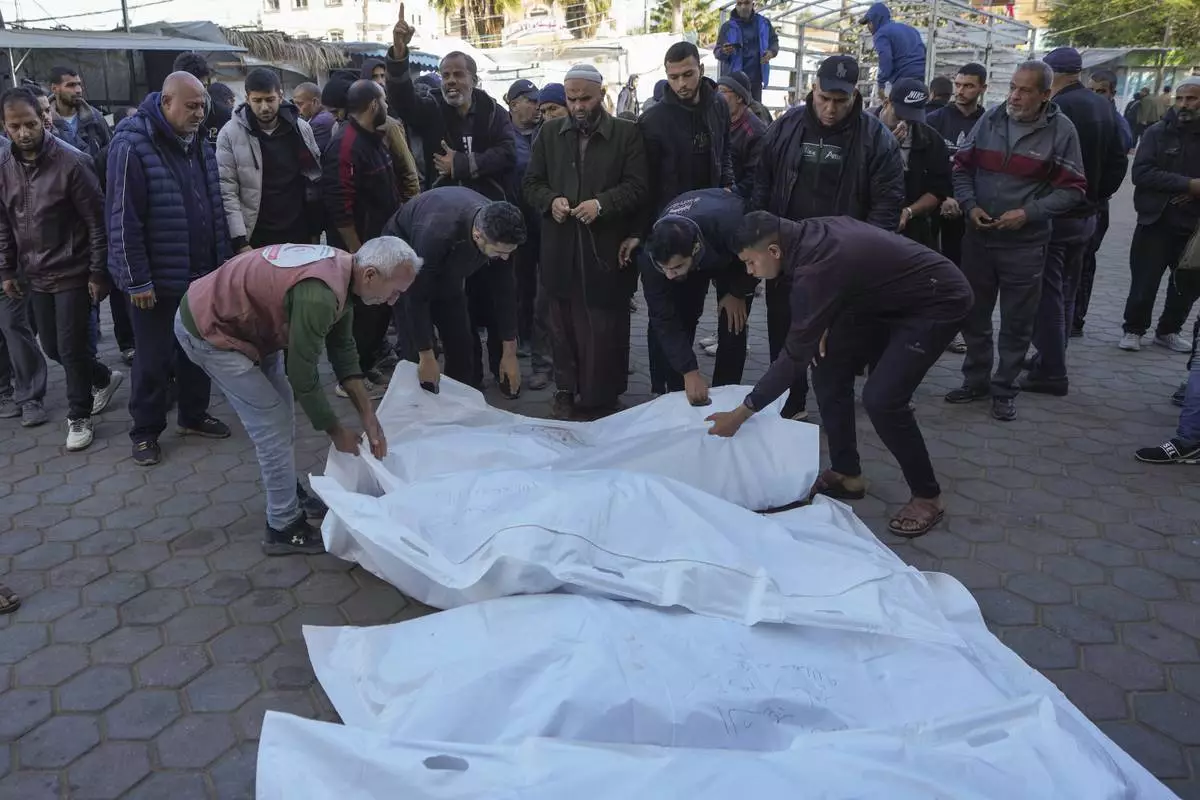
Bodies of victims of an Israeli airstrike at the Nuseirat refugee camp are prepared for the funeral prayer outside the Al-Aqsa Martyrs hospital in Deir al-Balah, Gaza Strip, Saturday, Dec. 21, 2024. (AP Photo/Abdel Kareem Hana)
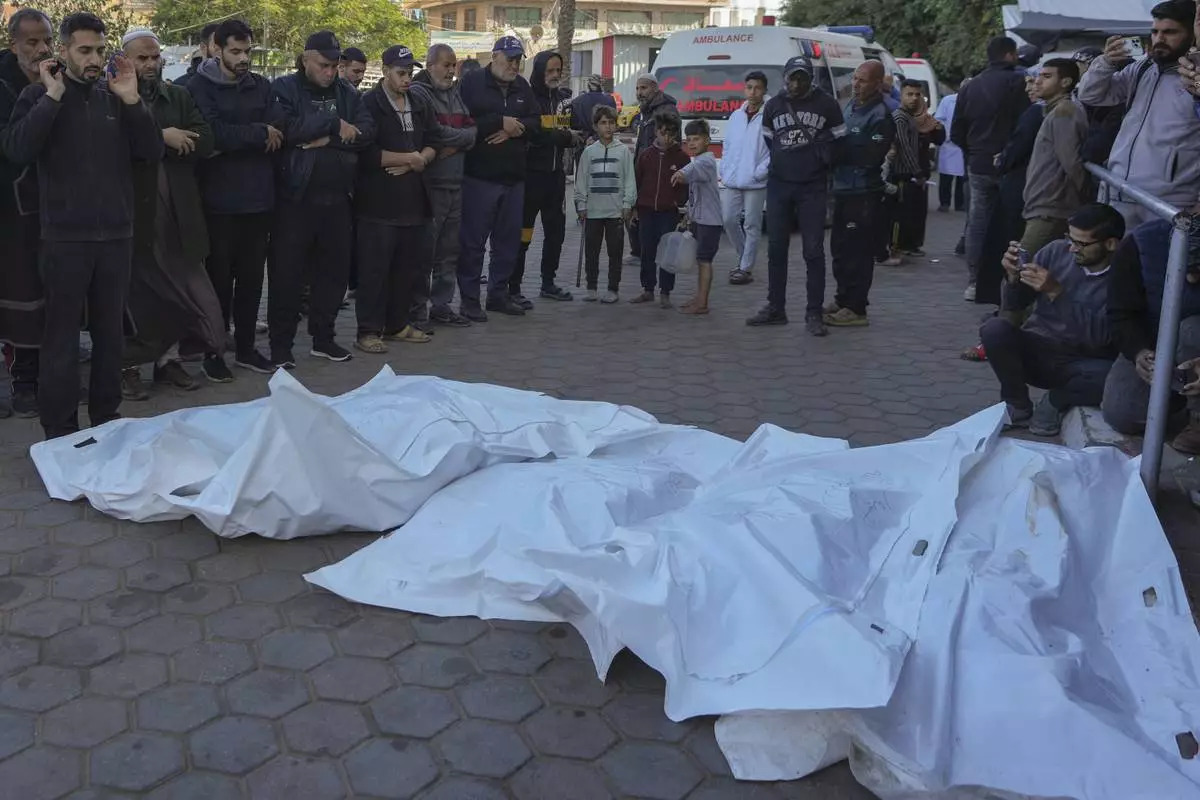
Men pray over the bodies of victims of an Israeli airstrike at the Nuseirat refugee camp during a funeral prayer outside the Al-Aqsa Martyrs hospital in Deir al-Balah, Gaza Strip, Saturday Dec. 21, 2024. (AP Photo/Abdel Kareem Hana)
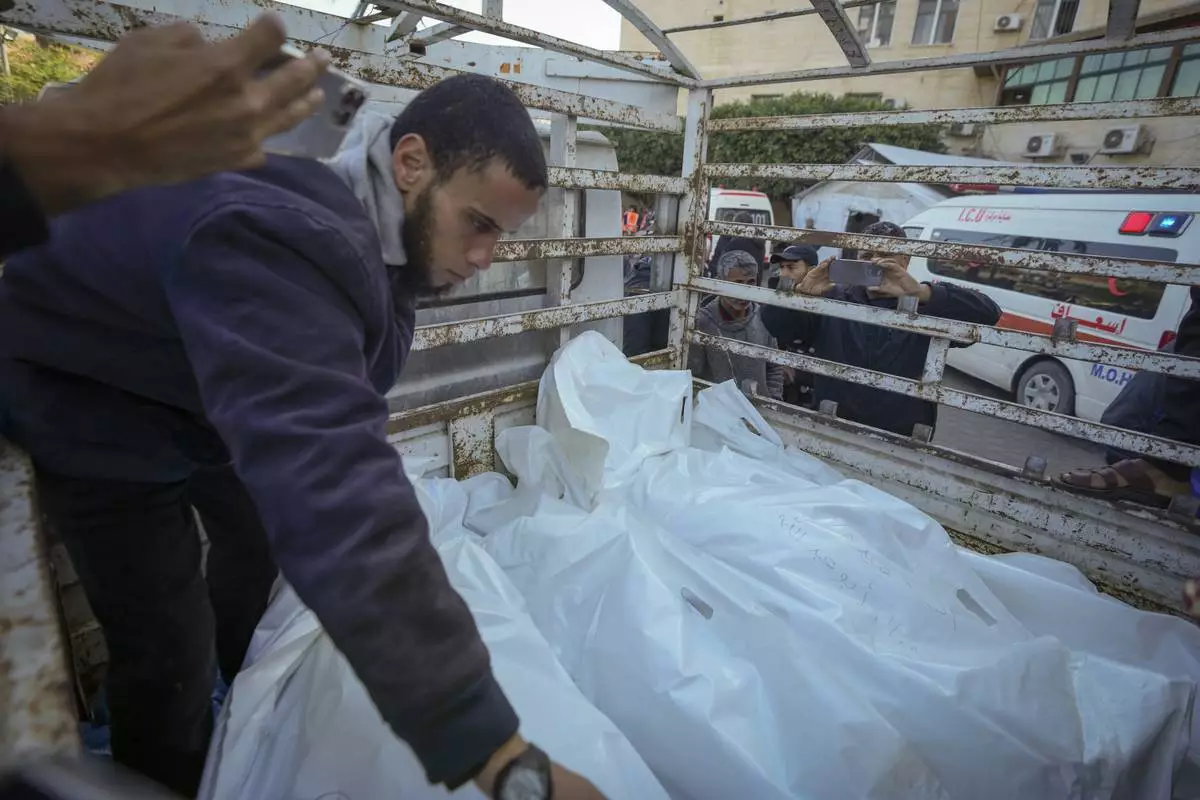
Bodies of victims of an Israeli airstrike at the Nuseirat arrive at the Al-Aqsa Martyrs hospital before their funeral in Deir al-Balah, Gaza Strip, Saturday, Dec. 21, 2024. (AP Photo/Abdel Kareem Hana)
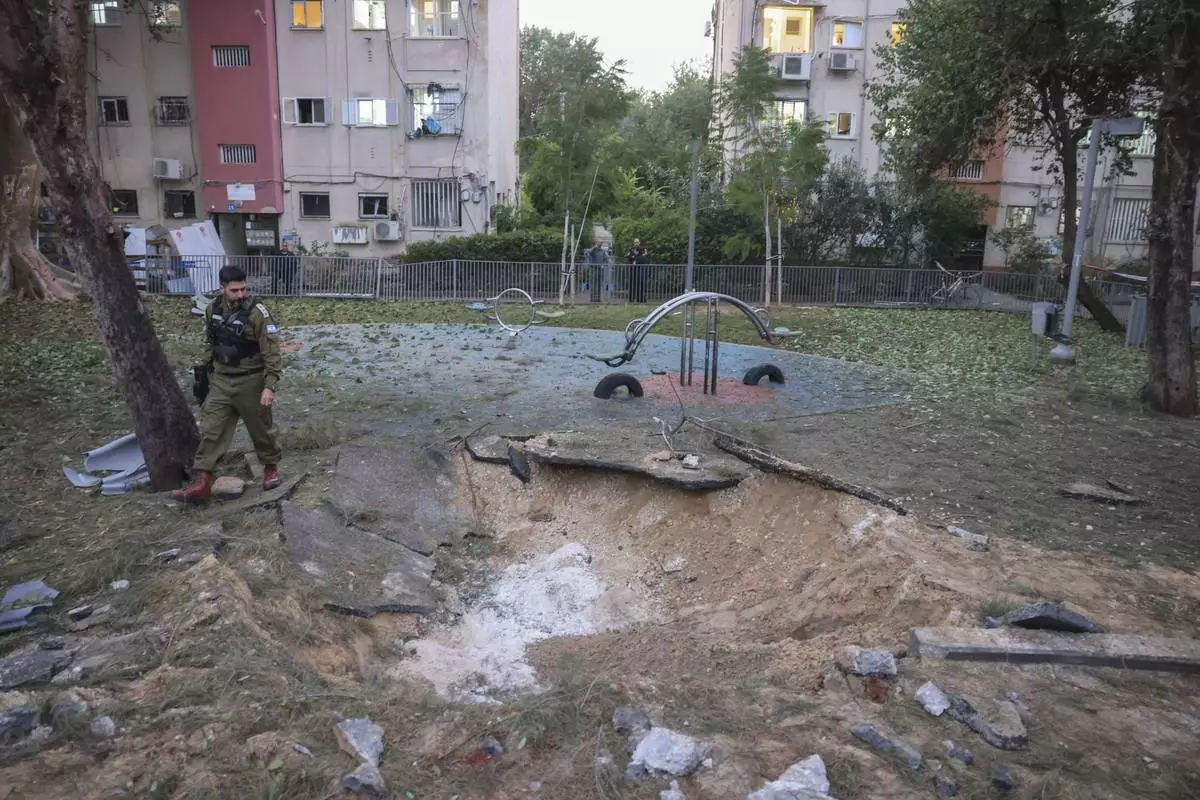
An Israeli soldier observes the site where the missile launched from Yemen landed Jaffa district, in Tel Aviv, Israel, Saturday, Dec. 21, 2024. (AP Photo/Tomer Appelbaum)











